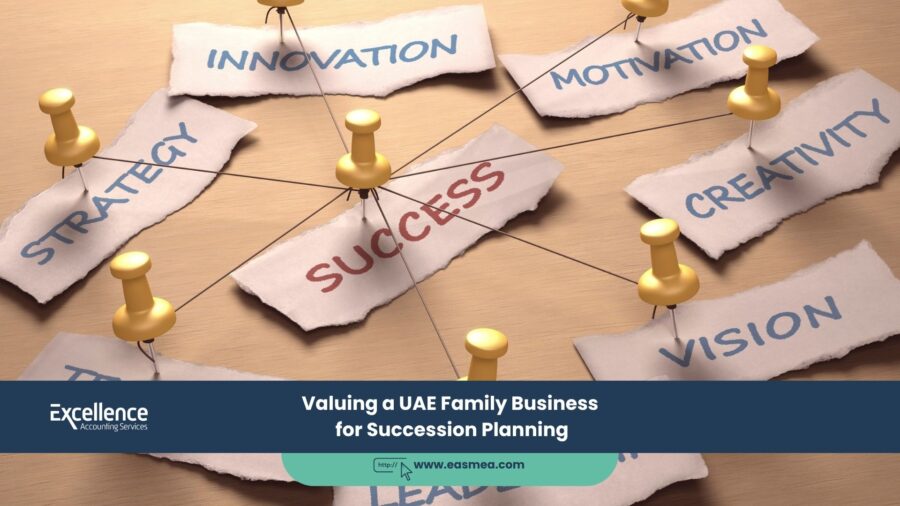Valuing a UAE Family Business for Succession Planning
Family businesses are the bedrock of the UAE economy, representing a powerful legacy of entrepreneurial spirit passed down through generations. However, the transition of leadership and ownership from one generation to the next is one of the most challenging moments in a family firm’s lifecycle. This process, known as succession planning, is fraught with emotional complexity, differing expectations, and the immense pressure of preserving both family harmony and the family’s primary source of wealth.
At the absolute center of a successful succession plan lies a process that must be approached with objectivity, professionalism, and care: **business valuation**. Determining the “fair value” of the business is not merely a financial calculation; it is the foundational step that enables fair treatment of all family members—both those who will run the business and those who will not. An unclear or disputed valuation can lead to resentment, conflict, and can ultimately threaten the very legacy the family seeks to protect.
This guide delves into the unique challenges and methodologies of valuing a private family business in the UAE for the specific purpose of succession planning. It explains why this process differs from a standard M&A valuation and how an independent, professional business valuation can provide the clarity and fairness needed for a smooth and successful transition.
Key Takeaways
- Purpose Dictates Process: Valuation for succession is different from valuation for an outright sale. The goal is fairness and continuity, not necessarily maximizing the sale price.
- Objectivity is Paramount: An independent, third-party valuation is crucial to remove emotion and bias from the process, ensuring all family members perceive the outcome as fair.
- It’s More Than Just Numbers: Valuing a family business requires understanding family dynamics, the roles of different family members, and the often-undocumented “secret sauce” that drives success.
- Valuation Sets the Stage for Fairness: The valuation provides the basis for structuring buyouts for non-active family members, allocating shares to the next generation, and estate planning.
- Early Planning is Key: The valuation process should begin years before the actual transition to allow for strategic improvements and thoughtful planning, often guided by expert CFO services.
Why Valuing a Family Business is Unique
Valuing a family firm for succession goes beyond standard financial models. It requires a nuanced understanding of factors that don’t appear on a balance sheet. The process must consider what we call the “Four C’s” of family business valuation.
- Continuity: Unlike a sale to a third party, the goal here is the ongoing success of the business. The valuation must consider the company’s ability to generate sustainable cash flow for the next generation, not just its liquidation value.
- Control: How is control being transferred? Is one child taking over, or will multiple siblings share control? The valuation may need to account for discounts for minority stakes or premiums for controlling interests.
- Cash Flow: The business is often the primary source of income for the entire family. The valuation must be realistic about the cash flow available to potentially buy out exiting family members without crippling the company’s operations and growth prospects.
- Conflict: The potential for family conflict is the biggest risk. A valuation that is perceived as unfair can create lasting divisions. The process must be transparent, well-documented, and defensible to all stakeholders.
In a family business, you are not just valuing assets and cash flows; you are valuing a legacy. The process must honor the past while providing a fair foundation for the future.
Valuation Methodologies for Succession Planning
While the context is unique, the core valuation methodologies remain the same. However, their application and weighting may differ. A professional valuator will use a combination of these methods to arrive at a defensible range.
1. Income-Based Approach (Discounted Cash Flow – DCF)
This is often the most relevant method for a going concern. It focuses on the future income-generating capacity of the business, which is what the next generation will inherit.
- How it Works: It forecasts the business’s future cash flows and discounts them back to a present value.
- Succession Context: The forecasts must be realistic, considering the transition of leadership. For example, will the founder’s departure impact customer relationships? The valuation must “normalize” earnings by adjusting for any non-business-related expenses or above/below-market salaries paid to family members.
2. Asset-Based Approach
This method values the company based on the fair market value of its net assets (assets minus liabilities).
- How it Works: Each asset (e.g., real estate, machinery, inventory) is appraised to determine its current market value.
- Succession Context: This approach is particularly useful for setting a “floor” value for the business. It helps answer the question: “What would be left if we sold everything?” It is critical for businesses that are rich in tangible assets, like real estate or manufacturing.
3. Market-Based Approach
This method compares the business to similar companies that have recently been sold or are publicly traded.
- How it Works: It uses valuation multiples (like EV/EBITDA) from comparable companies to derive a value for the family firm.
- Succession Context: This can be challenging for private family businesses as finding truly comparable companies is difficult. However, it provides a valuable “reality check” against the intrinsic valuation from the DCF method. It helps anchor the valuation in the current economic environment.
Navigating Your Family’s Future with Excellence Accounting Services (EAS)
Succession planning is one of the most important and sensitive journeys a family business will undertake. At EAS, we provide discreet, objective, and comprehensive support to ensure the process is smooth and fair.
- Independent Business Valuation: Our core service is providing a credible, independent valuation report that serves as the objective foundation for all your succession planning discussions.
- Pre-Valuation “Clean-Up”: We help prepare your business for valuation by performing accounting reviews and cleaning up financial records to ensure the data is accurate and defensible.
- Strategic CFO Services: We can act as your strategic advisor, helping you structure buyout agreements, analyze the cash flow impact of the succession plan, and prepare the business for a successful handover.
- Holistic Business Consultancy: We work with your legal advisors and family members to ensure the financial aspects of the succession plan are sound, sustainable, and aligned with your family’s long-term goals.
Frequently Asked Questions (FAQs)
Ideally, 5 to 10 years before the planned retirement of the senior generation. This provides ample time to groom successors, make strategic improvements to the business to enhance its value, and plan the transition thoughtfully without being rushed.
This is precisely why an independent, third-party valuation is essential. By engaging a professional firm, you are agreeing to trust an objective process. The valuator’s role is to provide a defensible number based on facts, not emotions, which can act as a neutral basis for negotiation and settlement.
These are captured implicitly within the Income-Based (DCF) approach. A strong brand and reputation lead to higher, more stable revenues and profits. These superior earnings are reflected in the cash flow forecasts, which in turn result in a higher valuation. They are not typically valued as a separate line item.
Fair Market Value is the price a willing buyer would pay a willing seller, with neither being under compulsion to transact. Strategic Value is the value a specific buyer (like a competitor) might pay, which could include a premium for synergies. For succession, we almost always focus on **Fair Market Value** to ensure fairness among family members.
The real estate should be professionally appraised to determine its fair market value. This value is then incorporated into an Asset-Based valuation. It’s also common for families to separate the real estate into a holding company that leases the property back to the operating business, which can simplify the succession process.
This is known as “key-person risk.” A valuation must account for this. If the business’s success is highly dependent on the founder, the valuation may be discounted to reflect the risk that profits could decline after their departure. This also highlights the need for a long transition period to transfer relationships and knowledge.
The valuation sets the price for their shares. The buyout can then be structured in various ways, often funded by the business’s future profits over several years through a promissory note. This allows the active siblings to pay the non-active sibling over time without draining the company of essential working capital.
Typically, you will need 3-5 years of historical financial statements, detailed breakdowns of revenue and expenses, lists of key assets, information on the company’s structure, and any business plans or forecasts that exist.
If there is significant potential for dispute, having two independent firms conduct a valuation can be a good strategy. If the values are close, they can be averaged. If they are far apart, it may indicate that a third valuation is needed to act as a tie-breaker. However, for most cases, one high-quality, defensible valuation is sufficient.
An M&A valuation is focused on maximizing the price from an external buyer and may include strategic value. A succession valuation is focused on determining a fair, sustainable value for the family. It often results in a more conservative, defensible number that ensures the business can continue to thrive while being fair to all family members.
Conclusion: A Foundation for the Future
Valuing a family business for succession is a profound exercise. It is a process that requires not only technical financial skill but also a deep appreciation for the human dynamics involved. By approaching the valuation with professionalism, objectivity, and a clear focus on fairness, you provide a stable foundation upon which the next generation can build. It is the ultimate act of stewardship—ensuring the legacy you built continues to prosper and provide for your family for generations to come.
Preserve Your Legacy. Ensure a Fair Transition.
Contact Excellence Accounting Services for a confidential consultation on valuing your family business for its next chapter.




